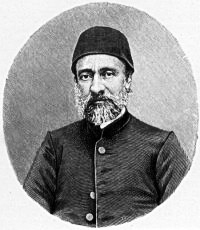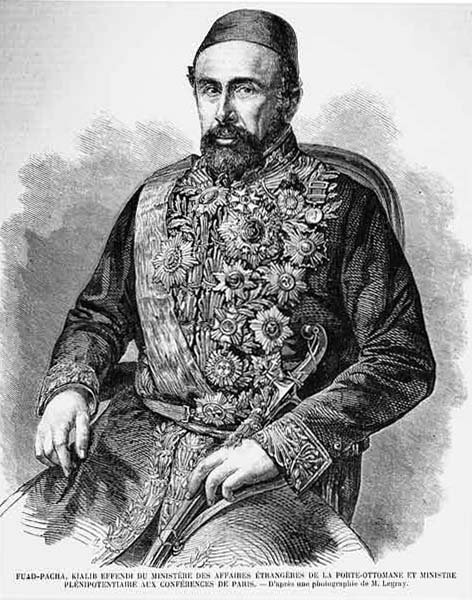|
Hatt-i Humayun Of 1856
The Imperial Reform Edict ( ota, اصلاحات خط همايونى, ''Islâhat Hatt-ı Hümâyûnu''; Modern tr, Islâhat Fermânı) was a February 18, 1856 edict of the Ottoman government and part of the Tanzimat reforms. The decree from Ottoman Sultan Abdulmejid I promised equality in education, government appointments, and administration of justice to all regardless of creed. The decree is often seen as a result of the influence of France and Britain, which assisted the Ottoman Empire against the Russians during the Crimean War (1853–1856) and the Treaty of Paris (1856) which ended the war. Hatt-ı Hümayun was a promise by the Sultan to his citizens, subjects. Sultan promised to be held responsible for the constitution of the "Provincial Councils" and "Communal Councils" and the fairness of this process and the results. In matters concerning all the subjects of the State (related with Hatt-ı Hümayun), the spiritual leader of every congregation, along with its official ... [...More Info...] [...Related Items...] OR: [Wikipedia] [Google] [Baidu] |
Ottoman Empire
The Ottoman Empire, * ; is an archaic version. The definite article forms and were synonymous * and el, Оθωμανική Αυτοκρατορία, Othōmanikē Avtokratoria, label=none * info page on book at Martin Luther University) // CITED: p. 36 (PDF p. 38/338) also known as the Turkish Empire, was an empire that controlled much of Southeast Europe, Western Asia, and Northern Africa between the 14th and early 20th centuries. It was founded at the end of the 13th century in northwestern Anatolia in the town of Söğüt (modern-day Bilecik Province) by the Turkoman tribal leader Osman I. After 1354, the Ottomans crossed into Europe and, with the conquest of the Balkans, the Ottoman beylik was transformed into a transcontinental empire. The Ottomans ended the Byzantine Empire with the conquest of Constantinople in 1453 by Mehmed the Conqueror. Under the reign of Suleiman the Magnificent, the Ottoman Empire marked the peak of its power and prosperity, as well a ... [...More Info...] [...Related Items...] OR: [Wikipedia] [Google] [Baidu] |
Journal Asiatique
The ''Journal asiatique'' (full earlier title ''Journal Asiatique ou Recueil de Mémoires, d'Extraits et de Notices relatifs à l'Histoire, à la Philosophie, aux Langues et à la Littérature des Peuples Orientaux'') is a biannual peer-reviewed academic journal established in 1822 by the Société Asiatique covering Asian studies. It publishes articles in French and several other European languages. Cited texts are presented in their original languages. Each issue also includes news of the Société Asiatique and its members, obituaries of notable Orientalists, critical reviews, and books received. The journal is published by Peeters Publishers on behalf of the Société Asiatique and the editor-in-chief is Jean-Marie Durand. It is one of the oldest continuous French publications. Abstracting and indexing The journal is abstracted and indexed in: Bibliographie linguistique/Linguistic Bibliography, ATLA Religion Database, Index to the Study of Religions Online, Index Isla ... [...More Info...] [...Related Items...] OR: [Wikipedia] [Google] [Baidu] |
François Belin
François () is a French masculine given name and surname, equivalent to the English name Francis. People with the given name * Francis I of France, King of France (), known as "the Father and Restorer of Letters" * Francis II of France, King of France and King consort of Scots (), known as the husband of Mary Stuart, Queen of Scots * François Amoudruz (1926–2020), French resistance fighter * François-Marie Arouet (better known as Voltaire; 1694–1778), French Enlightenment writer, historian, and philosopher *François Aubry (other), several people * François Baby (other), several people * François Beauchemin (born 1980), Canadian ice hockey player for the Anaheim Duck *François Blanc (1806–1877), French entrepreneur and operator of casinos *François Boucher (other), several people *François Caron (other), several people * François Cevert (1944–1973), French racing driver * François Chau (born 1959), Cambodian American actor ... [...More Info...] [...Related Items...] OR: [Wikipedia] [Google] [Baidu] |
Fuad Pasha
Mehmed Fuad Pasha (1814 – February 12, 1869), sometimes known as Keçecizade Mehmed Fuad Pasha and commonly known as Fuad Pasha, was an Ottoman administrator and statesman, who is known for his prominent role in the Tanzimat reforms of the mid-19th-century Ottoman Empire, as well as his leadership during the 1860 Mount Lebanon civil war in Syria. He represented a modern Ottoman era, given his openness to European-style modernization as well as the reforms he helped to enact. Among other posts, he served as Grand Vizier, the equivalent of Prime Minister, on two occasions between 1861 and 1866. He is often regarded, along with Mehmed Emin Âli Pasha, as one of the most influential Ottoman statesmen, who favoured a French-inspired civil code for the newly established civil courts in 1868. Fuad Pasha was a fervent supporter of keeping the empire an absolute monarchy, rejecting the ideas of being legally bounded or restricted by a constitution or legislature. He often clashe ... [...More Info...] [...Related Items...] OR: [Wikipedia] [Google] [Baidu] |
Le Moniteur (Ottoman Empire)
The ''Moniteur ottoman'' was a newspaper written in French and first published in 1831 on the order of Mahmud II.''État présent de l'empire ottoman'', p. 168. It was the first official gazette of the Ottoman Empire, edited by Alexandre Blacque at the expense of the Sublime Porte. Its name perhaps referred to the French newspaper ''Le Moniteur Universel''. It was issued weekly. Mahmud II wished to influence Europeans.Strauss, Johann. "Language and power in the late Ottoman Empire" (Chapter 7). In: Murphey, Rhoads (editor). ''Imperial Lineages and Legacies in the Eastern Mediterranean: Recording the Imprint of Roman, Byzantine and Ottoman Rule'' (Volume 18 of Birmingham Byzantine and Ottoman Studies). Routledge, 7 July 2016. , 9781317118442. Google Booksbr>PT192 ''Takvim-i vekayi'' was published a few months later, intended as a translation of the ''Moniteur'' into Ottoman Turkish. History The ''Moniteur ottoman'' was the first Ottoman bulletin. It was apparently inspired by ... [...More Info...] [...Related Items...] OR: [Wikipedia] [Google] [Baidu] |
Martin Luther University
Martin Luther University of Halle-Wittenberg (german: Martin-Luther-Universität Halle-Wittenberg), also referred to as MLU, is a public, research-oriented university in the cities of Halle and Wittenberg and the largest and oldest university in the German state of Saxony-Anhalt. MLU offers German and international (English) courses leading to academic degrees such as BA, BSc, MA, MSc, doctoral degrees, and Habilitation. The university was created in 1817 through the merger of the University of Wittenberg (founded in 1502) and the University of Halle (founded in 1694). MLU is named after Protestant reformer Martin Luther, who was a professor in Wittenberg. Today, the university campus is located in Halle, while ''Leucorea Foundation'' in Wittenberg serves as MLU's convention centre. Both Halle and Wittenberg are about one hour from Berlin via the Berlin–Halle railway, which offers Intercity-Express (ICE) trains. History University of Wittenberg (''Universität Wittenbe ... [...More Info...] [...Related Items...] OR: [Wikipedia] [Google] [Baidu] |
Samos
Samos (, also ; el, Σάμος ) is a Greek island in the eastern Aegean Sea, south of Chios, north of Patmos and the Dodecanese, and off the coast of western Turkey, from which it is separated by the -wide Mycale Strait. It is also a separate regional unit of the North Aegean region. In ancient times, Samos was an especially rich and powerful city-state, particularly known for its vineyards and wine production. It is home to Pythagoreion and the Heraion of Samos, a UNESCO World Heritage Site that includes the Eupalinian aqueduct, a marvel of ancient engineering. Samos is the birthplace of the Greek philosopher and mathematician Pythagoras, after whom the Pythagorean theorem is named, the philosophers Melissus of Samos and Epicurus, and the astronomer Aristarchus of Samos, the first known individual to propose that the Earth revolves around the sun. Samian wine was well known in antiquity and is still produced on the island. The island was governed by the semi-autonomous ... [...More Info...] [...Related Items...] OR: [Wikipedia] [Google] [Baidu] |
Christians
Christians () are people who follow or adhere to Christianity, a monotheistic Abrahamic religion based on the life and teachings of Jesus Christ. The words ''Christ'' and ''Christian'' derive from the Koine Greek title ''Christós'' (Χριστός), a translation of the Biblical Hebrew term ''mashiach'' (מָשִׁיחַ) (usually rendered as ''messiah'' in English). While there are diverse interpretations of Christianity which sometimes conflict, they are united in believing that Jesus has a unique significance. The term ''Christian'' used as an adjective is descriptive of anything associated with Christianity or Christian churches, or in a proverbial sense "all that is noble, and good, and Christ-like." It does not have a meaning of 'of Christ' or 'related or pertaining to Christ'. According to a 2011 Pew Research Center survey, there were 2.2 billion Christians around the world in 2010, up from about 600 million in 1910. Today, about 37% of all Christians live in the Am ... [...More Info...] [...Related Items...] OR: [Wikipedia] [Google] [Baidu] |
Jews
Jews ( he, יְהוּדִים, , ) or Jewish people are an ethnoreligious group and nation originating from the Israelites Israelite origins and kingdom: "The first act in the long drama of Jewish history is the age of the Israelites""The people of the Kingdom of Israel and the ethnic and religious group known as the Jewish people that descended from them have been subjected to a number of forced migrations in their history" and Hebrews of historical History of ancient Israel and Judah, Israel and Judah. Jewish ethnicity, nationhood, and religion are strongly interrelated, "Historically, the religious and ethnic dimensions of Jewish identity have been closely interwoven. In fact, so closely bound are they, that the traditional Jewish lexicon hardly distinguishes between the two concepts. Jewish religious practice, by definition, was observed exclusively by the Jewish people, and notions of Jewish peoplehood, nation, and community were suffused with faith in the Jewish God, ... [...More Info...] [...Related Items...] OR: [Wikipedia] [Google] [Baidu] |
Millet (Ottoman Empire)
In the Ottoman Empire, a millet (; ar, مِلَّة) was an independent court of law pertaining to "personal law" under which a confessional community (a group abiding by the laws of Muslim Sharia, Christian Canon law, or Jewish Halakha) was allowed to rule itself under its own laws. Despite frequently being referred to as a "system", before the nineteenth century the organization of what are now retrospectively called millets in the Ottoman Empire was not at all systematic. Rather, non-Muslims were simply given a significant degree of autonomy within their own community, without an overarching structure for the 'millet' as a whole. The notion of distinct millets corresponding to different religious communities within the empire would not emerge until the eighteenth century. Subsequently, the existence of the millet system was justified through numerous foundation myths linking it back to the time of Sultan Mehmed the Conqueror (r. 1451–81), although it is now understood that ... [...More Info...] [...Related Items...] OR: [Wikipedia] [Google] [Baidu] |





